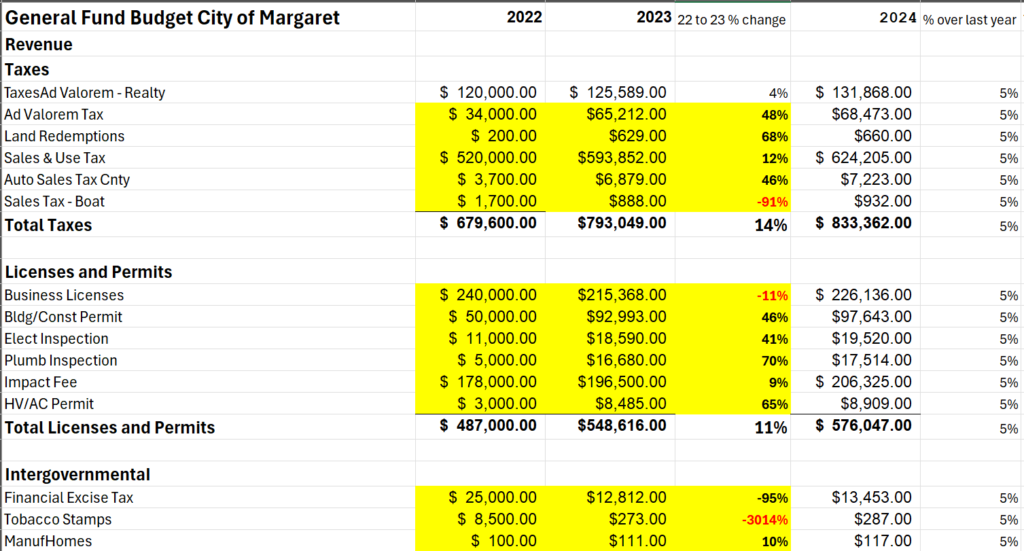A city budget is a lot like a household budget – but for 7,000 people. It’s not just a list of numbers. It’s a plan. It answers questions like:
- What can we afford?
- What needs to be repaired or upgraded?
- What emergencies do we need to prepare for?
- What kind of future are we building?
Just like a family sets aside money for groceries, rent, and car repairs, a city must plan for roads, water, sewer, patrol cars, fire trucks, sewer lines, parks, public safety, and other infrastructure. But unlike a household, a city’s operations don’t pause while we figure things out. Emergencies happen. Equipment breaks. Services are needed – daily. And so budgeting is one of the most important responsibilities of any city government.
🧾 Where We Started – and Where We Are Now
When I joined the City Council in November 2020, Margaret had approximately $1.87 million spread across multiple accounts – everything from the General Fund to dedicated accounts for Fire, Streets, Gas & Diesel, Youth, Court, and more.
What we lacked then – and still lack now – is a clear, strategic budget structure that connects those accounts to long-term planning and department needs.
By July 2025, our available cash balance had grown to over $6.5 million, including:
- $3.975 million in general city accounts
- $2.54 million in public works funds
$1,000,000 of that is bond money issued years ago for a sewer upgrade we still haven’t begun. Now there’s discussion about spending that money on a water tower.
When municipal funds pile up with no purpose that is irresponsible management of the taxpayers funds. It’s not planning – that’s drifting. And it’s why we need to get serious about budgeting.
🧭 What a Budget Is – and What It Isn’t
A budget is not just spending money. It’s planning how, when, and why to spend it – based on real needs and real goals. It shows the citizens that we are thinking ahead.
✅ A real budget:
- Helps departments operate without delay or political gridlock
- Plans for big-ticket items like fire trucks and patrol vehicles
- Lays out how we invest in essential services like sewer, water, and roads
- Brings transparency and accountability to every dollar
- Allows flexibility when emergencies or priorities shift
A “last year + 5%” budget:
- Ignores inflation, population growth, and emergencies
- Leaves departments without resources when they need them most
- Prevents strategic planning for equipment, staff, or capital projects
- Is based on history – not on reality or vision
🚨 We’ve Outgrown Running without a Budget
Since 2000, Margaret has grown from 1,100 residents to over 7,000. That’s a sixfold increase. And we became a legal city in 2011 – yet our budget still operates like a small town’s.
In recent years, our leadership has pushed heavily on a “last year plus 5%” approach that is not prepared by the council. But when I’ve asked simple questions about the budget, I don’t get answers and the topic gets dropped.
Why? Because real budgeting takes effort – and I’m not afraid of doing that work.
The example below was one of the last year plus 5% files that was given to me. The mayor tried to say we only grow at 5% so this is acceptable, but look at the differences in the previous 2 years.

Here’s what’s at stake:
- 🔥 Our fire department needs staffing for call volume and new equipment
- 🚓 Our police vehicles are aging while demand continues to rise
- 💧 Our sewer system has funding but no executed upgrade plan
- 🚰 Our city is overdue for a new water tower and water main
- 🛠️ And every department is still operating without proactive budgets
Departments shouldn’t have to wait for council meetings to fix broken equipment or buy needed supplies. They should have a plan they can manage and adjust within defined limits – not operate in uncertainty.
🛣️ Budgets Are Roadmaps – Not Chains
Budgets aren’t meant to be rigid. Emergencies happen. Priorities evolve. That’s why good budgets include flexibility, reserves, and oversight.
But without a real plan? We’re not budgeting – we’re just improvising.
So Where Do We Go From Here?
When elected, here’s how we will budget:
- A real capital improvement plan for vehicles, equipment, and infrastructure
- Needs-based budgets for each department – reviewed and adjusted annually with staff input
- Transparency around restricted funds (like sewer bond money) – so the public knows what’s being spent, where, and why
- Community engagement in the budget process – because your tax dollars deserve your voice
- Guardrails to prevent reallocation of critical funds without public discussion and planning
I’m Running for Mayor Because Margaret Deserves Planning – Not Guessing
We shouldn’t be improvising with taxpayer money.
We shouldn’t be letting $1 million in bond funds sit unused for years.
We shouldn’t be budgeting like a town of 1,100 when we’re a city of 7,000.
If you believe Margaret deserves better budgeting – and better leadership – join me. Let’s build a city that’s not just growing, but growing wisely.
Leave a Reply